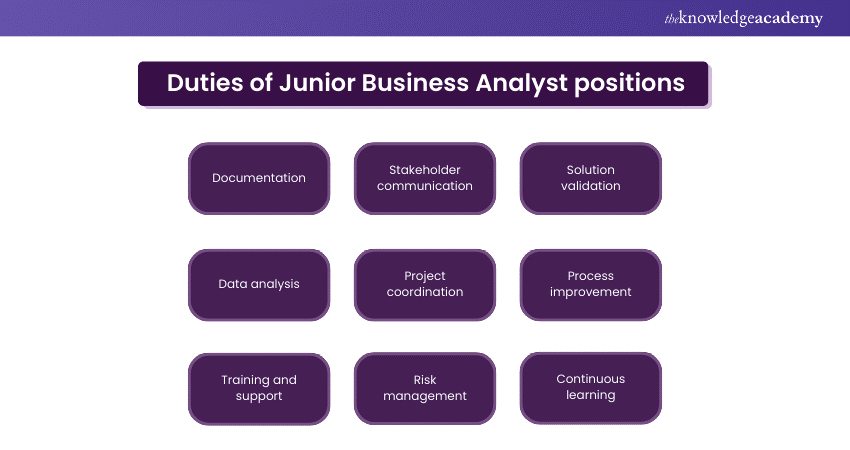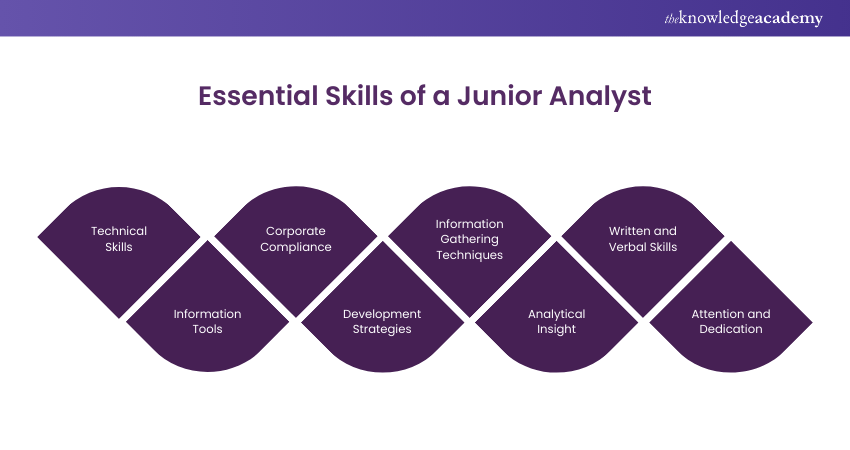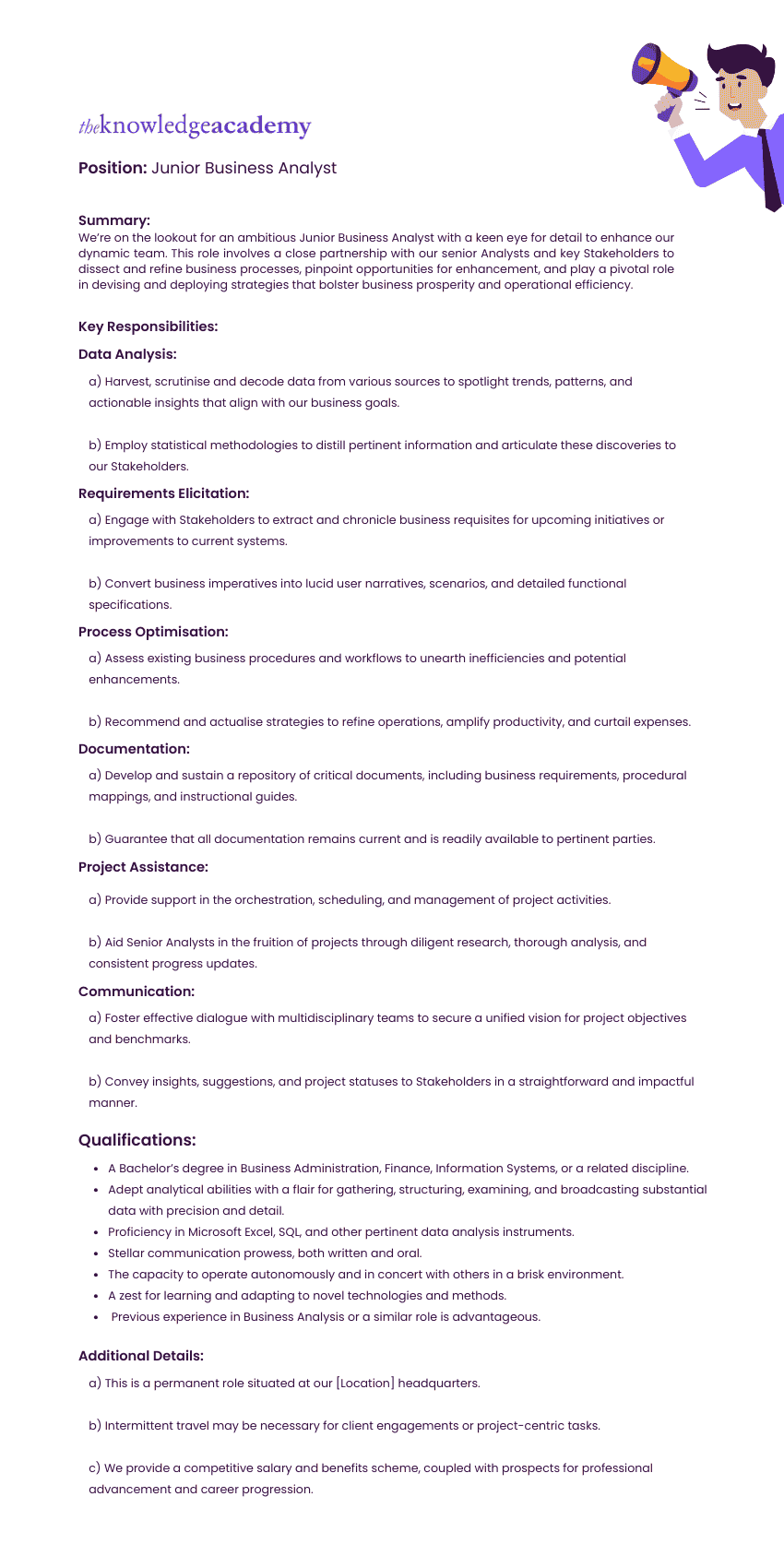We may not have the course you’re looking for. If you enquire or give us a call on 01344203999 and speak to our training experts, we may still be able to help with your training requirements.
We ensure quality, budget-alignment, and timely delivery by our expert instructors.

Business Analysts, including Junior Business Analysts, have become indispensable for companies aiming to maintain a competitive edge and nimbleness. As organisations navigate the shifting landscapes of industry demands, Junior Business Analysts play a pivotal role in turbocharging this evolution. They act as the vital link connecting business Stakeholders with technical units, interpreting and converting business requirements into practical insights and strategies.
So, if you are a budding Business Analysis professional, this blog can provide invaluable insights into the world of Junior Business Analysts. You can read this blog to navigate through the intricacies of this dynamic role. It will also help you uncover the core competencies and responsibilities that define success in this field.
Table of Contents
1) Who is a Junior Business Analyst?
2) Junior Business Analyst roles and responsibilities
3) Junior Business Analyst skills
4) Junior Business Analyst job description
5) How to become a Junior Business Analyst?
6) Junior Business Analyst career opportunities
7) How to Prepare for a Junior Business Analyst Interview?
8) Is SQL Required for Business Analysts?
9) Conclusion
Who is a Junior Business Analyst?
Junior Business Analysts play a crucial role in the operational sectors of an organisation, including sales, marketing, and customer service. Their main task is to collect and scrutinise market and industry data. They collect requirements, record procedures, and assist in the implementation of solutions in close collaboration with senior Analysts and Stakeholders.
A Junior Business Analyst is a multidimensional professional who plays a fundamental role in Project Management and Business Analysis. These Analysts assist teamwork by participating in many Project Lifecycle activities, guaranteeing alignment with organisational goals, and producing positive results.
Junior Business Analysts require a diverse skill set to excel in their roles. These skills span technical expertise, proficiency in information tools, understanding of corporate compliance, development strategies, effective information-gathering techniques, analytical insight, strong communication skills, attention to detail, and the ability to learn and adapt quickly.
Junior Business Analyst Roles and Responsibilities
Junior Business Analysts are assigned numerous essential duties within an organisation. Given below are a few of those important roles and responsibilities:

a) Documentation: Junior Business Analysts are in charge of recording project artefacts, requirements, and business processes. They produce thorough documentation to direct project implementation, including use cases, process flows, Functional Requirement Documents (FRDs), and Business Requirement Documents (BRDs).
b) Stakeholder Communication: They facilitate fruitful communication between Stakeholders, including business users, Subject Matter Experts (SMEs), Developers, and Testers. By serving as liaisons, they make sure that the expectations of the Stakeholders are recognised and taken into account.
c) Solution Validation: Junior Business Analysts participate in solution validation activities, including testing, User Acceptance Testing (UAT), and validation of deliverables against business requirements. They collaborate with Stakeholders to ensure that solutions meet quality standards and deliver desired outcomes.
d) Data Analysis: Junior Business Analysts support the analysis of data to find insights, patterns, and trends that guide business decisions. For Data Analysis and Stakeholder presentation, they employ tools including Microsoft Excel, SQL, and data visualisation software.
e) Project Coordination: In order to validate solutions, Junior Business Analysts assist in User Acceptance Testing (UAT) and verifying deliverables against business requirements. To make sure that solutions fulfil quality requirements and produce the intended results, they work in conjunction with Stakeholders.
f) Process Improvement: By examining current workflows and locating inefficiencies, Junior Business Analysts find areas for process improvement. They work along with Stakeholders to suggest practice ideas that maximise business workflows and promote operational excellence.

g) Training and Support: These professionals instruct and assist end users with new tools, procedures, and systems. In addition to leading training sessions and creating training materials, they oversee the process of guaranteeing user acceptance and competency.
h) Risk Management: Junior Business Analysts assist in identifying and mitigating project risks by conducting risk assessments, enhancing risk mitigation strategies, and monitoring risk throughout the Project Lifecycle. They collaborate with project teams to proactively address potential issues and minimise project impacts.
i) Continuous Learning: Junior Business Analysts engage in continuous learning to learn about industry trends, best practices, and emerging technologies. They seek opportunities to boost their skills and knowledge through training, certifications, and networking.
Become a vital asset to any organisation with our Business Analyst Fundamentals Training – join now!
Junior Business Analyst Skills
Junior Business Analysts require certain skills to thrive at the workplace. Some of them are discussed below:

1) Technical skills
Junior Business Analysts should possess proficiency in using software and tools relevant to Business Analysis. This includes familiarity with databases, data modelling tools, and Business Intelligence (BI) software to effectively analyse and interpret data.
2) Information Tools
Mastery of information tools such as Microsoft Excel, Visio, and PowerPoint is essential for Junior Business Analysts. These tools are used for Data Analysis, process mapping, and creating presentations to communicate findings and recommendations.
3) Corporate Compliance
Junior Business Analysts need to understand industry regulations and compliance standards relevant to their organisation. This knowledge ensures that projects and initiatives adhere to legal and regulatory requirements, mitigating risk and ensuring ethical business practices.
4) Development Strategies
Knowledge of methodologies such as Agile or Waterfall is crucial for Junior Business Analysts. Understanding these strategies enables them to effectively plan, execute, and monitor projects, ensuring timely delivery and alignment with organisational goals.
Enhance your career with our Business Analyst Qualification. Get certified now and unlock new opportunities!
5) Information Gathering Techniques
Junior Business Analysts should possess strong information-gathering skills, including the ability to conduct interviews, surveys, and workshops to gather requirements from Stakeholders. Effective information gathering ensures that project objectives are defined and understood by all parties involved.
6) Analytical Insight
Junior Business Analysts must be able to analyse data and derive actionable insights. This involves interpreting complex datasets, identifying trends and patterns, and making informed recommendations to support decision-making and drive business outcomes.
7) Written and Verbal Skills
Strong communication skills are essential for Junior Business Analysts to convey information effectively to Stakeholders and team members. This comprises writing clear and concise documentation, presenting findings and recommendations, and facilitating productive discussions.
8) Attention and Dedication
Junior Business Analysts should demonstrate attention to detail and deliver quality work. This involves thorough documentation, rigorous testing, and proactive problem-solving to ensure project success.
9) Analysis Interaction
Junior Business Analysts need to collaborate effectively with Stakeholders and team members throughout the Project Lifecycle. This includes actively participating in meetings, soliciting feedback, and fostering a collaborative environment to fulfil project objectives.
10) Basics Learning
Junior Business Analysts should be willing to adapt to new technologies and methodologies. This lets them stay updated with industry trends and contribute toward continuous improvement within the organisation.
Sharpen your analytical skills with our Introduction to Business Analytics Training – join us now!
Junior Business Analyst Job Description
A Junior Business Analyst typically has a range of responsibilities that revolve around supporting the analysis and improvement of business processes. Here’s a general overview of a Junior Business Analyst job description:

Acquire the skills to effectively analyse and solve business challenges in our Business Analyst Training - Register now!
How to Become a Junior Business Analyst?
If you aspire to become a Junior Business Analyst, follow these key steps to develop the skills and qualifications needed for the role:
1) Earn a Relevant Degree
A bachelor's degree in business administration, finance, information technology, or data analytics is often required. This educational background provides essential knowledge of business operations and analytical methods.
2) Gain Entry-Level Experience
Start in entry-level roles such as data analyst, project coordinator, or IT support. These positions help you build experience in business processes and data management. Internships and volunteer opportunities can also be valuable.
3) Develop Analytical Skills
Enhance your ability to interpret and work with data by learning tools such as Excel, SQL, and business intelligence software like Tableau or Power BI. Strong analytical skills are essential for making data-driven decisions.
4) Understand Business Processes
A solid grasp of business functions—including finance, operations, and marketing—will help you identify areas for improvement within organisations.
5) Obtain Relevant Certifications
While not always mandatory, certifications such as the Certified Business Analysis Professional (CBAP) or PMI Professional in Business Analysis (PMI-PBA) can enhance your credentials and demonstrate your expertise.
6) Build a Professional Network
Engage with experienced business analysts through networking events, industry associations like IIBA, or online platforms such as LinkedIn. Networking can provide valuable insights and job opportunities.
7) Prepare for Interviews
Practice answering common business analyst interview questions, focusing on your analytical skills, problem-solving abilities, and relevant experience.
8) Find a Mentor
A mentor in the field can offer guidance, industry insights, and career advice to help you navigate your professional journey.
By following these steps, you can effectively position yourself for a Junior Business Analyst role and lay the groundwork for career progression.
Streamline Your Processes – Connect with a Business Process Analyst Today!
Junior Business Analyst Career Opportunities
A career as a Junior Business Analyst opens the door to various growth opportunities across industries such as finance, healthcare, technology, retail, and consulting. As professionals gain experience, they can progress to roles like Business Analyst and senior business analyst, taking on greater responsibilities in data analysis, process optimisation, and stakeholder management. Specialisation options also exist in fields like data analysis, IT and systems analysis, and financial analysis, allowing analysts to refine their expertise. Additionally, those interested in leadership can transition into project management, product management, or operations management, while others may explore consulting, strategy analysis, or industry-specific roles such as healthcare analyst or supply chain analyst.
With businesses increasingly relying on data-driven decisions, the demand for business analysts remains strong, particularly in technology-driven sectors, financial services, and consulting firms. To enhance career prospects, Junior Business Analysts should focus on developing technical skills (e.g., Excel, SQL, Tableau, Power BI), business acumen, and communication skills while considering relevant certifications such as CBAP or PMI-PBA. By continuously improving their expertise and industry knowledge, professionals can position themselves for higher-level analytical, strategic, or managerial roles, making business analysis a dynamic and rewarding career path.
Bridge the gap between IT and business. Join us as an IT Business Analyst and shape the future of tech-driven solutions!
How to Prepare for a Junior Business Analyst Interview?
Consider these steps while preparing for a Junior Business Analyst interview
1) Research the company and industry
2) Understand Business Analysis principles
3) Align your skills and experience with job description
4) Practice interview questions
5) Review technical tools
6) Prepare your questions
7) Mock interviews
Is SQL Required for Business Analysts?
Yes, SQL is a crucial tool for business analysis, enabling analysts to query and manipulate large datasets efficiently. It supports tasks such as:
1) Extracting and modifying data
2) Aggregating and summarising information
3) Cleansing and transforming datasets
4) Integrating data from multiple sources
Conclusion
Junior Business Analysts play a pivotal role in the prosperity of their organisations by providing valuable insights, aiding in decision-making processes, and bolstering strategic efforts. With their extensive range of skills, dedication to continuous education, and enthusiasm for resolving challenges, these Analysts are equipped to deliver substantial impact within the business landscape.
Elevate your career to new heights with our Certified Business Analyst Professional (CBA-PRO) Course – join us now!
Frequently Asked Questions
What are the Five Questions of Business Analysis?

Understanding what, why, who, when, and how of a business opportunity or challenge centres around the five fundamental questions of Business Analysis. They support the definition of goals, the identification of Stakeholders, the scope, and the setting of deadlines.
What are the Six Pillars of Business Analysis?

The six pillars of Business Analysis—Stakeholder Analysis, Enterprise Analysis, Scope Definition, Requirements Analysis, Solution Assessment, and Business Case Formulation—ensure initiatives meet stakeholder needs and add value. Together, they form the foundation of effective Business Analysis.
What are the Other Resources and Offers Provided by The Knowledge Academy?

The Knowledge Academy takes global learning to new heights, offering over 3,000 online courses across 490+ locations in 190+ countries. This expansive reach ensures accessibility and convenience for learners worldwide.
Alongside our diverse Online Course Catalogue, encompassing 19 major categories, we go the extra mile by providing a plethora of free educational Online Resources like News updates, Blogs, videos, webinars, and interview questions. Tailoring learning experiences further, professionals can maximise value with customisable Course Bundles of TKA.
What is the Knowledge Pass, and how Does it Work?

The Knowledge Academy’s Knowledge Pass, a prepaid voucher, adds another layer of flexibility, allowing course bookings over a 12-month period. Join us on a journey where education knows no bounds.
What are the Related Courses and Blogs Provided by The Knowledge Academy?

The Knowledge Academy offers various Business Analyst Courses, including the Statistics Course, Business Analyst Fundamentals Training, and Business Process Mapping Training. These courses cater to different skill levels, providing comprehensive insights into the Business Intelligence Analyst Job Description.
Our Business Analysis Blogs cover a range of topics related to Junior Business Analysts, offering valuable resources, best practices, and industry insights. Whether you are a beginner or looking to advance your Business Analysis skills, The Knowledge Academy's diverse courses and informative blogs have got you covered.
Upcoming Business Analysis Resources Batches & Dates
Date
 Business Analyst Fundamentals Training
Business Analyst Fundamentals Training
Fri 21st Feb 2025
Fri 25th Apr 2025
Fri 20th Jun 2025
Fri 22nd Aug 2025
Fri 17th Oct 2025
Fri 19th Dec 2025






 Top Rated Course
Top Rated Course



 If you wish to make any changes to your course, please
If you wish to make any changes to your course, please


